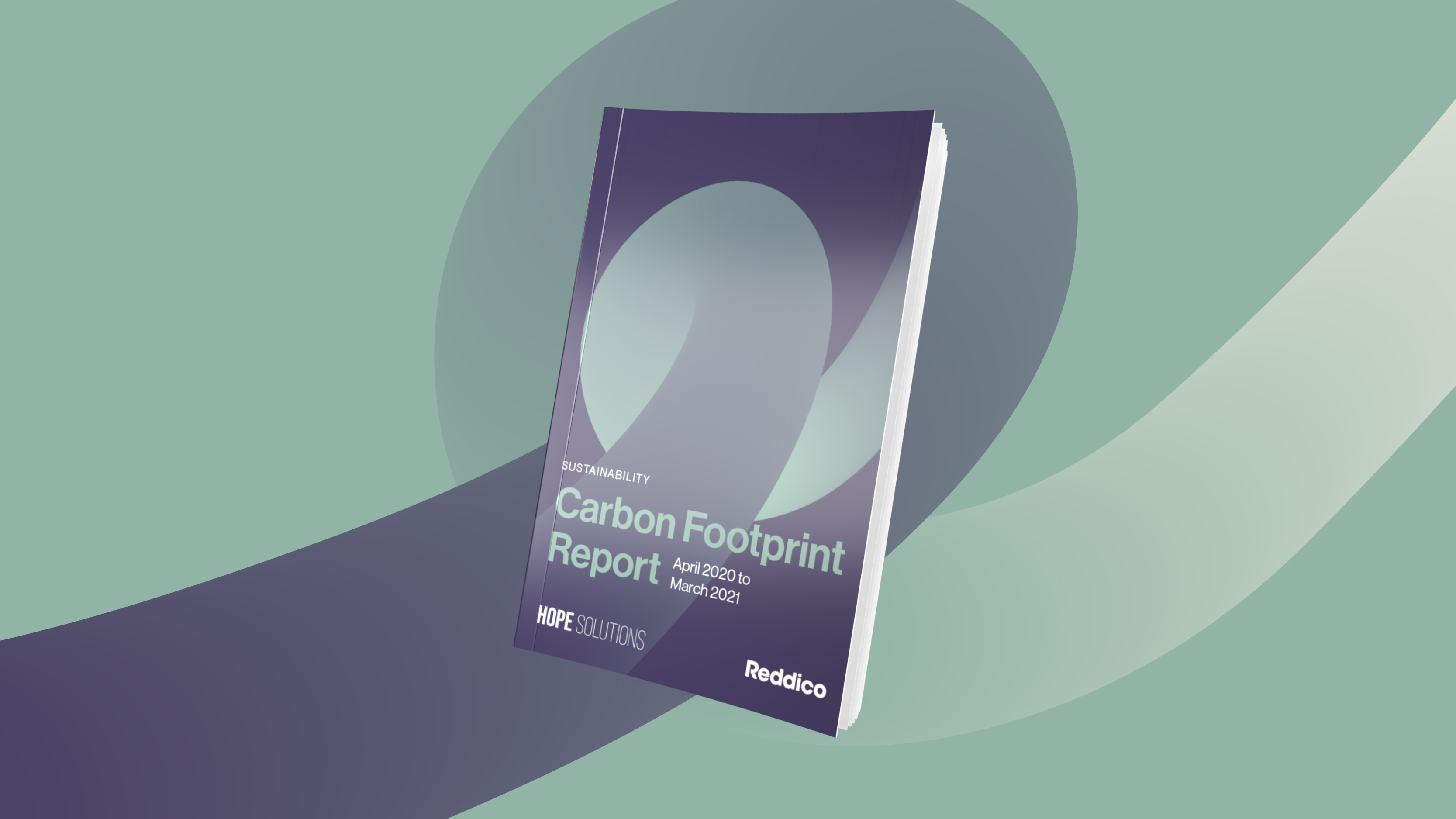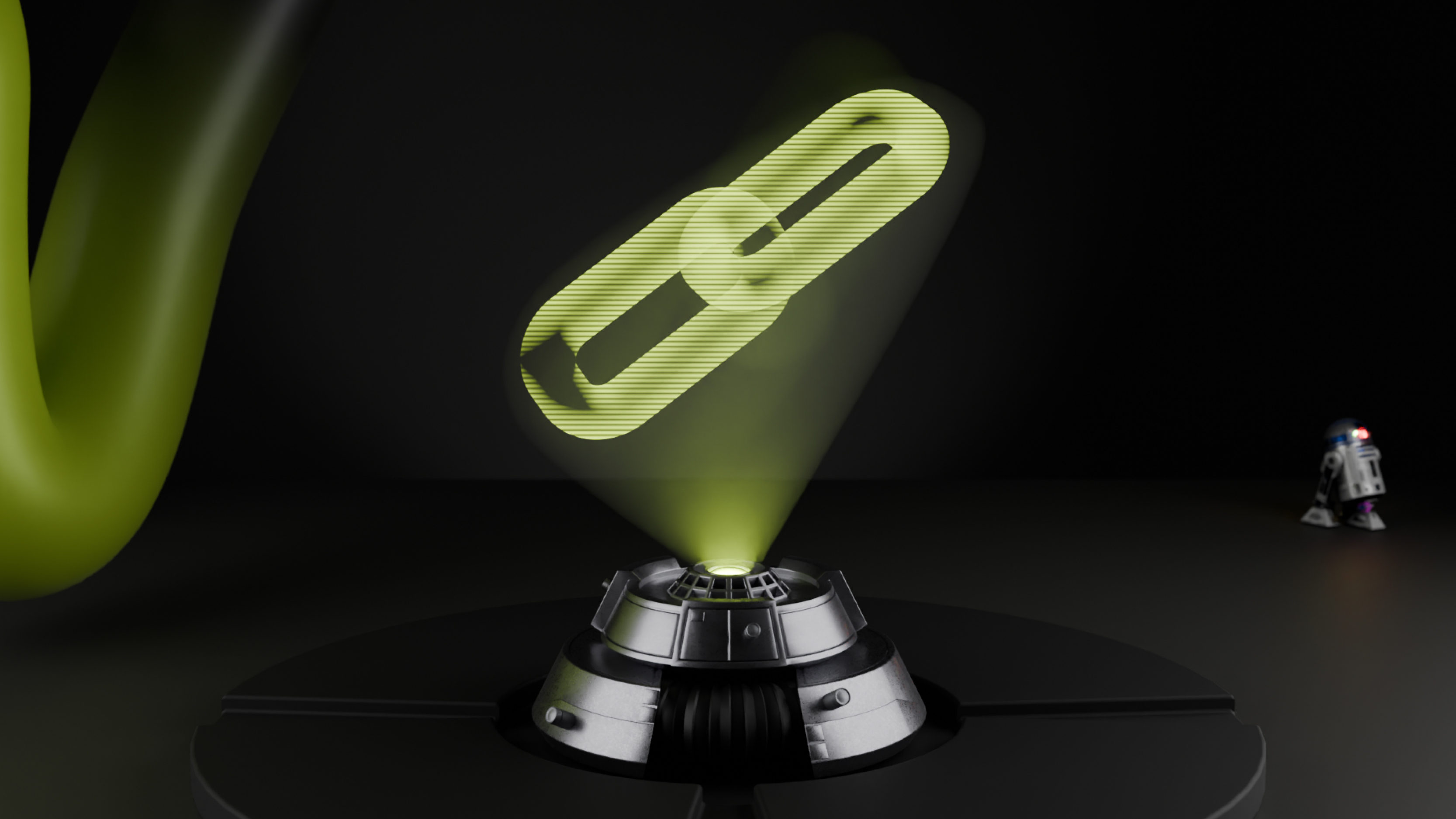
Benchmarking our carbon footprint
Since environmental concerns were first raised with the team during a Reddicon event in January 2020, we’ve been looking at how best we can reduce our carbon footprint. They say knowledge is power – which is why we decided to commission a carbon footprint report for April 2020 to March 2021. If we know the areas we need to work on, we can take steps to improve, getting closer to our goal of balancing people, planet and profit.

Who conducted our carbon footprint report?
Leading sustainability consultants Hope Solutions conducted our carbon footprint report. They offer bespoke services, including environmental impact assessments, energy management, waste and recycling interventions, solutions for carbon offsetting, and education and training.
Executive summary
Our total carbon footprint was 18.90 tonnes CO2e (this is our first year so no previous comparison is available)
Our carbon report for this year calculated that approximately 189 trees would need to be planted in order to offset the emissions associated with our business activities
During the reporting period, we planted 4,030 trees and offset 352 tonnes of carbon through Ecologi’s carbon credits.
By offsetting more than is emitted, we can claim to be carbon negative, although we are not yet certified as carbon negative.
High-level breakdown of the emission sources
Source: GHG Protocol
Scope 1: Direct emissions
These are emissions from activities owned or controlled by Reddico.
Scope 2: Indirect emissions (energy)
These emissions are released into the atmosphere, in association with Reddico’s consumption of purchased energy, such as electricity and heat. Indirect emissions are a result of our energy use, but occur at sources we don’t own or control.
Scope 3: Indirect emissions (other)
These emissions are a consequence of Reddico’s actions that occur at sources we don’t own or control, but aren’t considered to be Scope 2. Examples include business travel, waste disposal, and materials bought by Reddico.
Scope 1 | Emissions activity | Emissions (tCO2e) |
Gas | 0.28 | |
Scope 2 | Electricity | 1.21 |
Scope 3 | Water supply | 0.02 |
Wastewater treatment | - | |
Waste produced & disposal | - | |
Purchased goods & services | 7.42 | |
Employee home working | 8.30 | |
Employee commute | 0.75 | |
Digital | 0.6 | |
Well to Tank | 0.22 | |
Transmission & distribution | 0.1 | |
Total CO2e footprint | 18.90 tCO2e | |
Emissions per key area of impact
Office energy
Reddico’s total gas use in the office during the reporting period was 1,223 kWh, which is 1.5% of our total carbon footprint. Our total electricity use during the reporting period was 5,205 kWh, which is 6.4% of our total carbon footprint.
This makes our office energy use below average. The average UK small business uses:
15,000 kWh of gas per year
25,000 kWh of electricity per year
(source: Hope Solutions)
It makes sense that our figures for this category would be relatively low, as we operate a remote-first policy and our team works from home the majority of the time.
Water
Reddico’s total water use for the reporting period was 45㎥, which is 0.01% of our carbon footprint.
Purchased goods and services
Hope Solutions calculated the emissions caused by Reddico’s purchased goods and services by using the sector-specific average of kg CO2e per every pound spent.
The total tonnes of CO2e for purchased goods and services was 7.42, which is 39.3% of our carbon footprint.
These goods and services were broken down as follows:
Category | Total kg CO2e |
Services from membership organisations | 8 |
Food and drink products | 37 |
Computer services | 51 |
Printing | 68 |
Radio, television and communications | 69 |
Post and telecommunications | 96 |
Soap and toilet preparations | 106 |
Legal, consultancy, other business activities | 177 |
Other service activities | 236 |
Furniture | 540 |
Office equipment | 6,032 |
Digital services
The total tonnes of CO2e for digital services was 0.6, which is 3.2% of our carbon footprint.
Employee commute
The total tonnes of CO2e for employee commuting was 0.75, which is 4% of our carbon footprint. This would have been affected by the three lockdowns which took place during the reporting period, as well as Reddico’s move to being a remote-first company.
Homeworking
The team provided information about their homeworking set-ups. An assessment was then carried out by Hope Solutions to calculate the associated emissions, including emissions from office equipment and heating.
The total tonnes of CO2e for employee homeworking was 8.3, which is 43.9% of our carbon footprint.
Summary of areas to work on
As part of our efforts to continue to reduce and eliminate our emissions over the coming year, Hope Solutions provided the following recommendations for each area.
Office energy
Continue to lower electricity and gas consumption by monitoring and recording total consumption every year.
Speak to the office landlord about switching electricity to a green provider on a green tariff.
Speak to the office landlord about decarbonising gas through electrification, heat networks, or heat pumps.
Look for local grants that support the switch to cleaner energy.
When current electrical appliances are no longer working, replace them with energy efficient ones.
Switch off laptops, computers and monitors when not in use.
Turn off lights in unoccupied meeting rooms.
Water
Continue to accurately measure and monitor water usage.
Speak to the office landlord about installing water meters.
Encourage the team to report dripping taps and leaks.
Install low-flush toilet cisterns and aerated taps.
Purchased goods and services
Ask suppliers to provide emissions data for the goods and services they’ve provided.
Ask suppliers for information about their carbon footprint.
Survey suppliers to understand how many of them are aligned to our sustainability goals. Prioritise suppliers who support these goals.
Ask suppliers to provide a life cycle analysis of products so you can understand the impact they have.
Create an assessment policy to use when evaluating potential suppliers.
Digital services
Carry out an assessment of the digital services used.
Collaborate with other industry-wide organisations to raise awareness around the lack of transparency around sustainability.
Compare server PUE with Google Cloud and other industry averages to measure a potential reduction in the amount of power required and possible CO2e reduction if we migrate 100% to the cloud.
Employee commute
Continue to survey the team about their commuting habits.
Promote active travel like cycling. (Note: We started doing this by introducing the Cycle to Work Scheme.)
Look for grants to invest in secure bike storage for the office.
Ask the office landlord about setting up an electric charging point at the office.
Homeworking
Encourage the team to switch to green tariffs for their home energy.
Encourage the team to switch off appliances when they’re not in use.
Encourage the team to use energy efficient lighting.
Share resources which help the team make the switch.
Tree planting and carbon offsetting
We understand that trees can take up to 15 years before they really start to sequester carbon. A tree planted today does not remove the emissions immediately, it takes a long long time. We plant trees as part of our future drawdown efforts through Ecologi, who partner with a number of companies, including One Tree Planted, The Future Forest Company, Protect Earth, and Eden Rainforest Projects. All these organisations provide evidence of trees planted.
As well as planting trees with Ecologi, we are also able to support carbon reduction projects such as the Solar project in Rajasthan, India or Wind Energy in Edirne, Turkey. This provides us with carbon credits to offset the footprint of the business and also the personal lives of the team.
Our carbon report for this year calculated that approximately 189 trees would need to be planted in order to offset the emissions associated with our business activities in the 2020/21 financial year.
(source: Hope Solutions)
During the reporting period, we planted 4,030 trees and offset 352 tonnes of carbon through Ecologi’s carbon credits.
Month | Year | Trees | Carbon Tonnes |
April | 2020 | 312 | 30.34 |
May | 2020 | 312 | 30.34 |
June | 2020 | 312 | 30.34 |
July | 2020 | 370 | 30.34 |
Aug | 2020 | 312 | 30.34 |
Sept | 2020 | 324 | 31.51 |
Oct | 2020 | 324 | 31.51 |
Nov | 2020 | 324 | 31.51 |
Dec | 2020 | 348 | 33.84 |
Jan | 2021 | 348 | 17.41 |
Feb | 2021 | 0* | 0* |
March | 2021 | 744 | 54.75 |
Total | 4030 | 352.23 |
* February’s commitment was made in the month of March
(source: Ecologi)
By offsetting more than is emitted, we can claim to be carbon negative, although we are not yet certified as carbon negative.
What we’ve done since the report
Since the report was carried out, we’ve pushed forward in the following areas:
Installing a Hive to better control temperature and energy use when the office is not in use
Engaging the landlord to switch to a green energy tariff and installing solar panels
Installing flow limiters on the sinks to reduce the rate of water flow
Encouraging the team to switch to green energy suppliers (currently on hold due to the energy crisis)
Holding regular education sessions to raise awareness of environmental issues and help the team make changes in their own lives
Producing a guide on how to set up your home office in an energy efficient way
Providing a list of recommended suppliers based on their environmental credentials
Million Tree Pledge
In November 2021 we joined the Million Tree Pledge, aiming to plant a million trees by 2030 as part of our efforts to support carbon drawdown for future generations.
Over the last year we have partnered with Ecologi to plant trees as part of our carbon-offsetting measures. To date we have planted over 15,000 trees and while this is something we’re certainly proud of, we felt we needed more of a big vision behind this. By pledging to plant a million trees, this represents a milestone in our escalating efforts to be better ancestors to the planet’s future inhabitants.
Final thoughts
Whilst it’s brilliant that Reddico is a carbon negative company and our overall energy use is much less than the average UK small business:(source: Hope Solutions)
This report was done in a year where we were forced to work from home, so, as things open up, we know our emissions will increase. However, this first year will act as a benchmark for us to measure future changes, and we’ll conduct a yearly review to keep monitoring our impact.
As we head into the next financial year, our aim is to continue to reduce, offset and support future draw down of carbon from the atmosphere. We also plan to review our historic carbon footprint since Reddico was established. We look forward to making these changes in the coming year.
Sign-up to Reddico News
To keep up-to-date with the latest developments in the world of SEO, our insights, industry case studies and company news, sign-up here.




